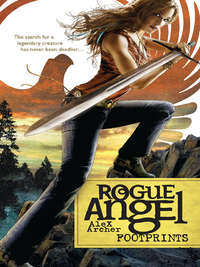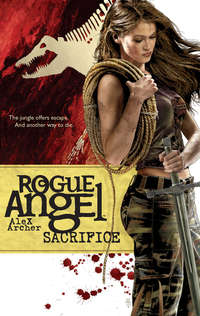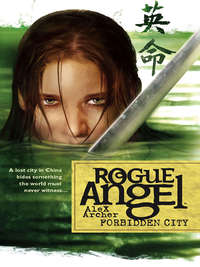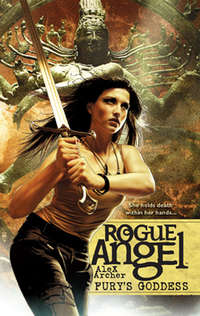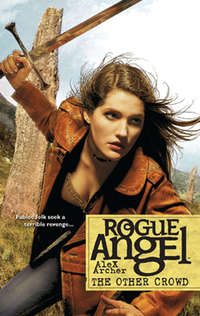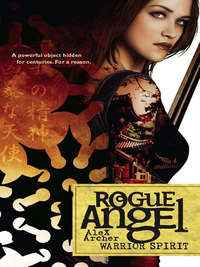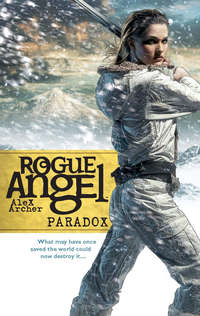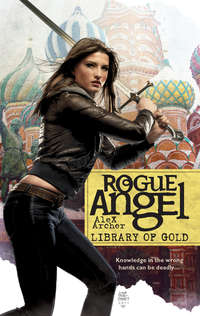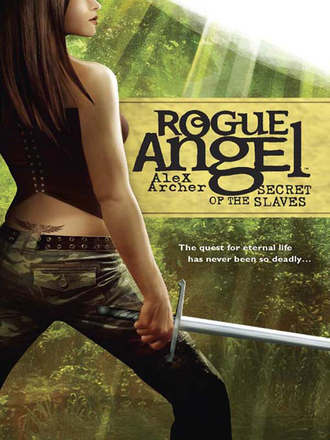
Полная версия
Secret Of The Slaves
Her eyes narrowed. I know that voice, she thought. It sounds so familiar.
“Ms. Creed?” She was certain of the Irish accent.
“Oh. Yeah. Sorry. This is Annja.”
“Ms. Creed, my name is Iain Moran. I’m a musician. You may have heard of me.”
“ Sir Iain Moran?” Annja asked. It couldn’t be.
“The same.” Her mind’s eye could see that famous smile, at once roguish and world-weary.
“Publico? Lead singer for T-34?”
“The very one.”
“Right,” Annja was in no mood for pranks.
“Don’t hang up! Please. I really am Sir Iain Moran.”
“Sure. Multibillionaire rock stars call me every day. If Doug Morrell put you up to this, you’re both way overdue for a good swift kick to the—”
“Please. I’d very much like to consult you on a professional matter, concerning your expertise. Would it help to assuage your doubts if my helicopter collected you on the roof of your flat in fifteen minutes?”
It was original, as pranks go. She had to give her caller that. “You’re on,” Annja said, daring her caller to push this as far as it would go.
Fifteen minutes later she stared openmouthed into the brownish haze of a hot Brooklyn day. Her face and hair were whipped by the downblast as a Bell 429 helicopter descended to the roof.
2
A man with long dark blond hair blowing out behind his craggy face was striding toward the helicopter as its landing gear bumped down into the yellow painted circle of the skyscraper’s helipad. He wore a tan suit with a dark chocolate tie blown back over his shoulder.
Two men stood flanking the doorway the long-haired man had emerged from. Their hands were folded before them and they looked like slabs in black suits. Even from a distance Annja got the impression their musculature was the force-fed beef characteristic of U.S. ground-force soldiers, not the torturously detailed sculpting of weight-room juicers.
The pleasant young Asian woman in a blue-gray business suit who had originally squired Annja aboard the helicopter, and smilingly evaded the questions Annja peppered her with, helped Annja into the heat of the Manhattan summer morning. The man in the pale suit neared. His face split in a smile.
“I’m Sir Iain,” he said, raising his voice to carry over the dying whine of the engine and the slowing blades. “Or Publico, if you prefer.” He took the hand Annja extended in a dry, strong grip.
“It was good of you to accept my invitation on such short notice,” he said. He put fingertips behind Annja’s shoulder and applied gentle pressure. “I’m a huge fan of your work. Your writing, as well as your television career. Please, come with me.”
She found, as he guided her toward the doorway, that she did not resent the physical contact. He was around her height, five-ten maybe five-eleven. His shoulders and chest seemed massive, which seemed unusual for a rock musician; she had them pegged as mostly on the weedy side. But his sense of presence loomed like a skyscraper and warmed like the sun.
There was no mistaking that this really was the famous Publico. There were those blue eyes, pale as the northern Irish sky beneath which he’d grown up. There was the famous craggy profile, looking more like a prizefighter’s than a rock and roller’s, thanks to the nose famously smashed by a British paratrooper’s rifle butt during a Dublin demonstration. The voice, gravelly yet the more compelling for it, was compliments of an Ulster policeman’s baton that nearly crushed his larynx.
Unlike a lot of celebrities, neither Moran nor his two longtime bandmates had any whiff of the poseur about them. They had been there and done that, protesting the English occupation of Northern Ireland, as well as the bloody sectarian violence of both Catholics and Protestants. They’d earned the admiration of the world and the hatred of zealots on all three sides, and had paid their dues in real blood and pain.
The band’s music reflected the socialist activism of its members as well as their fervent Christian convictions—decidedly less popular among their audience, which spanned the age range from preteens to baby boomers. But their sincerity won over even the most irreligious—as did their hard-rocking music.
Annja was intrigued. He seemed wholly aboveboard. Despite the unsolicited contact his manner was correct and friendly. Charisma emanated from him like heat from a forge.
“What exactly did you whisk me here for, Sir Iain?”
He offered a lopsided smile and bobbed his head once. “Fair enough question,” he said. “Permit me to answer with one. How would you like to save the world?”
“That’s not an offer an archaeologist hears very often,” she said. “But I’m afraid I can’t contribute much to any of your causes.”
“It’s not money we want,” he said. “But your courage, your skills—your soul.”
She looked at him and he grinned.
“How would you like to see an authentic cursed tome?” he asked.
She grinned back. “You do know the way to a lady’s heart, sir,” she said. “Lead on.”
“I T’S IMPRESSIVE ,” she said.
With his two shadows drifting along behind—making little more noise than shadows—Moran had squired her down into the skyscraper and to a window he assured her was bulletproof polycarbonate, double paned.
It looked out, and down, on a cold room. In the middle of the sterile white floor, twelve feet below them, stood a large cylinder with what looked like a mirror-polished brass base and a similar cap. The cylinder itself was clear.
“It’s Lexan, as well,” Sir Iain said. “Treated with a special coating inside and out that resists corrosion.”
On a gleaming chrome pedestal within the cylinder rested a book. It was certainly grand enough—the approximate size and shape of an unabridged dictionary. The cover was thick and cracked from what she could see on the open book. The pages were brown. She could just make out faded, crabbed brown writing on them.
“Nitrogen environment?” she asked.
“Of course.”
She tried not to thrill at that rolling deep baritone.
She turned a raised brow to him. “I’m surprised you’re interested in rare books.”
“You think all rock ’n’ rollers are illiterate, hell-raising dopers?” He shrugged. His shoulders rolled impressively inside his immaculately tailored coat. “I’ve been clean and sober since my well-publicized overdose. I’ve had to find something to do with my time since other than read the Bible.”
I N A ROOM down a flight of stairs he gestured toward a large flat-screen monitor, hung above a modern workstation of stainless steel. Several other computers were set up at other stations. On the big screen two pages were represented many times larger than life. Here the ink looked purplish rather than brown.
“It’s the journal of an eighteenth-century Portuguese Jesuit,” Moran said, “recounting his journey up the far Amazon.”
“A lot of Jesuits made the trip in those days,” Annja said.
“Indeed. I rather suppose they did. Would you care to read it?”
“I generally prefer to read the original document when it’s available,” she said. “The camera so seldom catches everything”
She was a hands-on sort of woman where historical artifacts were concerned. It was a major reason she’d chosen to be an archaeologist as opposed to a historian. She didn’t just want to study history. She wanted to feel history. To see where it had taken place, to hold in her hands implements—or documents—that had changed the world. She wanted to breathe the same air the heroes and heroines of history—unknown and world famous—had breathed when they performed their great deeds. She wanted to be part of history.
And I am, she thought. A lot more literally than I’m comfortable with.
“Not possible, I fear,” he said.
“I understand,” she said, unable to repress a little sigh of frustration. “Obviously it’s in an extremely fragile state to require such extreme preservation measures.”
“You don’t understand, Ms. Creed,” he said. “Everyone who handles this book dies. Horribly.”
She looked aside. A wall-sized window, waist high, opened into the cold room from the reading chamber. The book itself in its high-tech bell jar looked even more impressive closer up.
“I don’t believe in curses, Sir Iain.”
His laugh was short. “There’s nothing paranormal about it,” he said, “or not overtly so. The pages and binding are imbued with a hitherto unknown living organism that is not unlike slime molds. It attacks whoever touches it, both by means of airborne spores and by contact. The effect resembles a cross between flesh-eating bacteria and sarin gas. It isn’t pretty. And it is extremely fast acting. As well as untreatable by any known means.”
“Nice.” She sucked in a sharp breath. The air was cool, smelled vaguely of ozone. “How did you get it back here?”
“Carefully. Very carefully.”
She went to the workstation and sat in the chair. Reading was dead easy. A black wireless mouse controlled a cursor on the screen. She could point to icons around the perimeter of the image. When she ran the cursor over them, text tips popped up.
“Interesting,” she said, frowning slightly in concentration at the huge high-definition screen. “Are these the pages it’s currently open to?”
“Yes,” he said, “although you can page through it. The entire volume has been digitized.”
“I see. Well, it’s open to a very dramatic passage. Our author’s talking about what seems to be the end of his journey, of both the wonders and hazards he encountered—a colossal snake—had to be an anaconda. They’re one of the world’s largest. And, whoa, a golden onza. Hmm.”
“You can read that? That easily?”
“I specialize in archaic Romance languages, Sir Iain.”
“But the handwriting—it’s all just spider tracks to my eyes. Worse than my handwriting, and that’s saying a packet.”
She smiled. “As I guess I hinted earlier, this isn’t the first old Portuguese Jesuit diary I’ve looked at.”
“What’s a ‘golden onza ’?” he asked. “It seemed to strike you as significant.”
“An onza is a jaguar. A golden onza is a particularly impressive specimen. Larger than life, you might say. Legend imbues them, some of them anyway, with incredible intelligence and sometimes outright supernatural powers.”
“Indeed.”
“Okay. Apparently our priest was captured by Indians, blindfolded and taken to something called quilombo dos sonhos, ” Annja said as she continued reading.
She sat back. “ Dos sonhos translates as, ‘of dreams,’” she said. “But what’s a quilombo? ”
He pulled a chair over next to hers and sat, leaning slightly forward, with his elbows on his thighs. “Have you heard of the Maroons, then?”
She turned to face him. “If I recall correctly, that was a name for escaped New World slaves who fought guerrilla campaigns against recapture—sometime with pretty significant success. Toussaint-Louverture ran the French colonial overlords clean out of Haiti. Of course, I suspect they’d be called terrorists today.”
“These quilombos, I’m told, were settlements the Brazilian Maroons formed in the wilds, mostly along the coast,” he said. “Some eventually became republics powerful enough to stand off their erstwhile oppressors for centuries. A few actually maintained their independence until the Brazilian empire became the republic in 1889. Several are still around today as townships.”
He sat back and draped an arm over the back of his chair.
“The most famous of all was the Quilombo dos Palmares in northeastern Brazil. It held out against Dutch attacks, as well as Portuguese, until it was reduced by artillery in 1694.” He frowned. “Curious, really. My researchers inform me they also traded quite frequently with the Dutch and the English, for arms to use against their former masters.”
“Alliances were elastic in those days,” Annja said, drawn irresistibly back to the big screen. “As well as these days, and all other days I’ve ever read about. This quilombo the good Father describes—”
“Father Joaquim,” he said.
“The settlement was a sizable domain including rich farmland—which I thought was actually pretty rare in the Amazon Basin. It surrounded a fabulous city called Promessa—the Promise. There he describes himself as being treated as an honored guest by the inhabitants, whom he says are mostly intermarried Africans—those escaped slaves, I’m guessing, although they seem to have wandered pretty far from the Atlantic Ocean—and Amazonian Indians. He says the people are ‘well-versed in all arts and philosophy.’”
The rock star said nothing. His gaze was so intent she could feel it on her cheek like sunlight. But she was engrossed in the ancient manuscript.
She read through several more virtual pages before surfacing, more to draw a breath than to report. “He speaks of meeting savants whom he claims come from Asia. He might actually know what he was talking about. The Jesuits loved the Orient almost as much as they did South America. He could have spent time in Asia himself. Claims to have witnessed miracles from artificial light to almost instantaneous wound healing and treatment for all manner of disease. And here he writes, ‘Moreover the citizens know not aging, nor die, save by misadventure, or foul murder, or their own choice—wherein, sadly, they flout the Divine Will.’”
She gazed up at the screen a moment more. Then she sighed heavily.
“Okay,” she said, turning around to face her host again. This time there was an edge in her voice as chilly as the air in the room. “So this is a treasure hunt, right?”
The rough-hewed face split in a smile that had thrilled tens of millions of concertgoers—not to mention scores of CEOs and world rulers whom he addressed in his self-assumed capacity of global humanitarian activist.
“Imagine a world,” he said in a low, compelling voice, “in which there’s no disease, no suffering. No death.
“That would be a treasure worth hunting, wouldn’t you say, Ms. Creed?”
3
“With all respect,” Annja said, sipping green tea in a commissary appointed like a five-star restaurant, with dark oak paneling, bronze rails and ferns in place of the more traditional scuffed Formica counters and coffee machines, “Fountain-of-youth yarns have abounded in the Americas since, roughly, forever. As do fanciful accounts from the age of exploration. For that matter, the Jesuits have been known to bend the truth for their own purposes.”
Ignoring his chai latte, Moran nodded encouragingly. “That’s one of the reasons I contacted you,” he said. “You obviously believe in reason, in evidence. You are also willing to keep an open mind.”
“I did wonder,” she said. “I’m not the most famous TV archaeologist on television by a long shot.”
She smiled a bit lopsidedly. “Then again, if it was boobs you were after, you’d have called Kristie Chatham.”
“If you’ll forgive a momentary lapse in political correctness, Ms. Creed,” he said in that voice that had thrilled hundreds of millions, “you’re a beautiful woman. At the same time I’m sure you appreciate a man in my position seldom lacks for attractive female companionship, should that be his intent. For my part I’ve tried to put my wild past behind me. So I also hope you’ll understand that your striking appearance had nothing to do with my interest in engaging your services.”
She set down her cup. Her cheeks felt hot. “Now you’re flattering me.”
“Not a bit of it.”
“Well, after a speech that gallant, the least you could do is call me Annja.”
“Done. If you’ll consent to call me Iain,” he said.
“It’s a deal.” She sat back in her chair, picked up her cup and regarded him through a curl of steam rising into the cool air.
“You don’t strike me as the sort to fall for every goofy New Age notion to float past you in a cloud of pot smoke. I presume you have evidence more compelling than a wild diary, even if its pages are protected by a killer mystery fungus. Impress me.”
“I’ll do my best—Annja. In the favelas —the brutal slums—of northeastern Brazil they still speak of the quilombo dos sonhos. Legends still speak, also, of a magical city called Promise, where no one ever dies.”
“Such legends aren’t exactly uncommon worldwide, despite the inroads of science,” Annja said.
“So I thought. Until a hardheaded German business associate of mine, an aggressive atheist and skeptic, began experiencing remarkable dreams. Of a beautiful city, hidden deep in Amazon rain forest, filled with beautiful, ageless people who combined indigenous lore, Asian wisdom and Western science to create a cultural and technological paradise. In these dreams he got flashes of psychic phenomena, of cars that fly without wings or even visible engines.
“Hypnotic regression seemed to substantiate that these were real memories, submerged and now attempting to resurface. I see you look skeptical. I hardly blame you. But when we dug deeper we found recurring spells when my acquaintance dropped out of sight during trips to Brazil. It’s an aggravating thing. He cannot be documented to have ever gone deeper into Amazon than Belém, where the Amazon enters the Atlantic. He merely—vanished.”
An aide appeared, a ponytailed young blond woman in jeans. She handed several manila envelopes to Moran. He thanked her with a smile.
Beckoning to Annja to come closer, he turned and opened one of the folders on the tabletop. “Here are the medical records for my friend,” he said, setting out sheets of paper typed in English with names blacked out. With a forefinger he pushed a color photograph toward her. It showed the bare upper torso, from neck to just above the groin, with a puckered crescent from an appendectomy scar. She was glad the photo cut off where it did.
“Here’s a ‘before’ picture,” Moran said, tapping the image. “And here’s the ‘after.’”
He pushed another photo beside the first. Annja frowned. It showed the same pale, slightly pudgy torso as the first photo, with a distinctive reddish mole at four o’clock from the navel to clinch the identification. But the surgical scar was gone.
“You don’t have to go to the wilds of Brazil to have cosmetic surgery to remove scars,” Annja said.
“You rather make my point, I think,” Publico said with a smile.
Annja shrugged. “I’m intrigued. I’ll admit that much.”
He showed her a frank grin. “So you’re to be a hard sell. Well, I’d expect nothing less of you.”
He braced hands on thighs and stood. “Well, come with me, if you will, and I’ll see if I can sell you.”
“B RAZIL HAS QUITE A HISTORY of widespread and well-documented UFO sightings, you know,” Publico said. “What if some of the Maroons, retreating up the river from encroaching colonists, stumbled upon a crash site?”
They walked along the side of a sunken room Moran referred to as his “command center.” Large plasma monitors hung from the ceiling over rings of workstations where staff wearing Bluetooth earpieces typed rapidly and spoke in earnest murmurs.
Annja chuckled. “I’m not sure that’s the tack to take,” she said. “You know I’m the show’s resident skeptic.”
“Ah, but you have an affinity for the strange, as well.”
She crossed her arms and smiled tightly to hide the little shudder that ran through her. How true that was, she thought.
To divert attention from herself she gestured around them and said, “Where are we, anyway? What’s this building? Yours?”
“In a manner of speaking. It’s the New York headquarters of my eleemosynary network. It belongs to the institute, not to me personally. Although I admit I have freedom of the place.”
“I’m impressed at the word eleemosynary.”
“Not all my degrees are honorary, Ms. Creed. My MBA from Harvard, for example.”
“A Harvard MBA? I thought you were antiestablishment, antiglobalization and all that.”
“Ah, but running a humanitarian operation—actually a global network ranging from relief agencies to activists for a score of worthy causes—is an incredibly demanding task. So I learn the enemy’s skills to use against him, as it were.”
“If you say so.”
He turned to face her. “Annja, I understand your skepticism. But why not go and see for yourself? That’s what the spirit of scientific inquiry is about, isn’t it?”
“Well…yes. And I have to admit you’ve at least given me enough to intrigue me.”
“What do I need to make you passionate? I spoke earlier of saving the world. How about it? You can literally save the world—or many of the people who live on it—by helping track down the secret of conquering death. What else are you doing that’s more exciting? More magnificent?”
“Well. Nothing. Since you put it that way,” Annja said. She felt breathless, overwhelmed, needing to take back a little control of the conversation. “What if there’s nothing to it? I can’t promise results. It will probably turn out to be baseless.”
“Then you’ll do it?”
“I asked you first.”
He laughed aloud. Some of the earnest heads down in the pit turned up to look at him, then back to their business. Annja supposed they were saving the world in the event eternal life didn’t pan out.
“I won’t ask even you to deliver what does not exist,” he said. “But I suspect if I asked the impossible, in just the right way, you’d deliver.”
“Flattery will get you—well, I guess it usually works in the real world, doesn’t it?”
“I never flatter,” he said simply. He took her gently by the arm. “Come and meet your associate.”
“A NNJA , this is Dan Seddon,” Publico said. “He’ll be accompanying you to Brazil.”
They stood in an echoing space beneath what appeared to be the interior of a pyramid of translucent white blocks. A young man stood in the center, next to a slowly rotating statue of dark metal, possibly bronze. The shape suggested a feather sprouting from the floor. He turned with a certain fluid, alert grace at their approach.
When he saw Annja he smiled. She smiled back and held out her hand. He took it and shook it firmly. He didn’t seem the sort to kiss it.
He had a stylish brush of hair, either brown or dark blond, frosted lighter blond. His eyes were a green or hazel, not too different from Annja’s own and alive with curiosity. His face was a tanned narrow wedge with dark brows. His nose had been almost patrician thin and straight, but had been broken at least once and had a bump in the bridge to give it character. His grin had a practiced flash to it.
“Good to meet you, Ms. Creed,” he said, businesslike enough. He wore a lightweight jacket over a white shirt and blue jeans. His shoes were walking shoes, good quality. That scored points with Annja. An experienced field archaeologist who also tramped great distances in the course of her work with Chasing History’s Monsters, she knew the value of good footwear.
“My pleasure, Mr. Seddon,” she said. “So, you’re an archaeologist?”
“No.”
“Anthropologist?”
“No.” His manner was relaxed. Perhaps even a trifle superior.
“Dan is a troubleshooter,” Publico put in as smoothly as his gravelly voice would allow. “He’s been a major activist for years, campaigning against globalization all over the world. Seattle 2000. Italy ’03. Now he specializes in getting things done for me. He’s proved himself a key part of my humanitarian operations.”
Seddon smiled a lazy smile.
Annja frowned. “I’m sure Mr. Seddon has great abilities in his field,” she said. “But I’m not sure what he brings to the table for an archeological expedition.”
“It doesn’t really rise to the level of an expedition yet,” Publico admitted. “I hope it’ll turn into one. In the opening phases, though, it’s likely to entail a combination of intensive historical research and detective work.”
“You’ve got the historical angle nailed,” Seddon said with a grin. “I know you’re good at that. Not like that bimbo Kristie.”
Maybe this guy is okay, Annja thought.
“Mark’s career as a campaigner has involved no small amount of investigative work,” Moran said.


